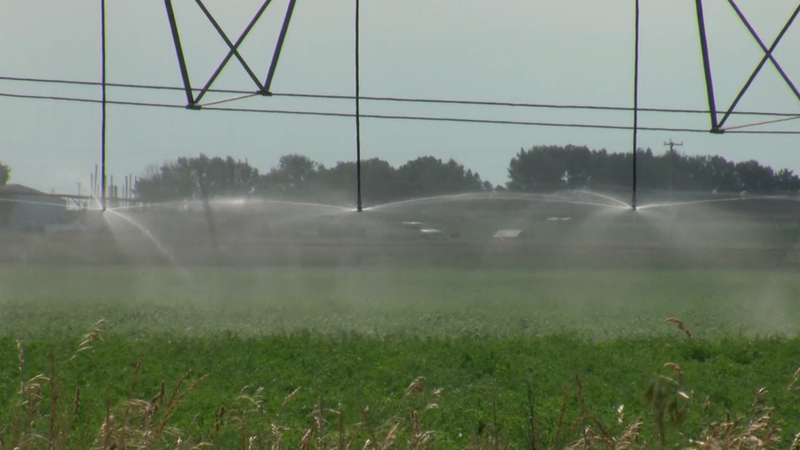The mayor of Fundy Albert says the community of Alma, N.B., is asking for some public washrooms to close in an effort to conserve water. Alma, near Fundy National Park, fills with tourists when the summer months arrive. That often leads to a request to conserve water. "Surprisingly, the use of washrooms is what is significantly contributing to the amount of water that is being used in Alma," Robert Rochon said.
Decision to reactivate Vancouver fountains that use drinking water questioned amid B.C. drought concerns
The recent decision to reactivate several Vancouver-owned fountains that use millions of litres of drinking water annually is being scrutinized as B.C. officials sound the alarm about worsening drought conditions across the province. The five fountains are not capable of recirculating water, meaning that water is pumped in, used once and flushed into the sewer – something Park Board Commissioner Tom Digby considers wasteful.
B.C. tightens water use in face of twin crises of wildfires, drought
British Columbia has ordered the oil and gas industry to temporarily stop diverting water to operations in one northeast district, and is now considering banning water use by other industries in other parts of the province, as it tries to conserve resources for its fight against the twin crises of drought and wildfires. At a news conference in Vancouver on Thursday, government officials explained that B.C.’s government is also working with municipalities, regional districts and First Nations to escalate restrictions on personal water usage.
Water use restriction issued for County of Newell
Low water flow in the Bow River has forced the Eastern Irrigation District (EID) to issue a water use restriction for the County of Newell. The EID says they have seen a dramatic drop in average river flow levels in both the Bow River and Highwood River this year. In a typical year flow in the Bow River starts to drop off by the middle and end of July. This year the EID says the Bow River dropped by the beginning of June.
Nova Scotia farmers worried about water use amid dry spring
A Nova Scotia farming group is concerned about the amount of water being used for agriculture this spring, but a provincial hydrologist says underground water levels are normal for this time of year. The current conditions have prompted Agriculture Canada to classify much of Nova Scotia as "abnormally dry," and categorize Truro and part of the Annapolis Valley as having a moderate drought. "It's getting to a point now where things are really drying out," said Allan Melvin, a sixth-generation farmer from the Annapolis Valley and president of the Nova Scotia Federation of Agriculture.
City of Nanaimo residents advised to be conscious of water use as spring progresses
Following some drier weather recently, City of Nanaimo officials are advising residents to be cautious with water consumption as spring progresses. Mike Squire, city water resources manager, said the Jump Creek reservoir is 91 per cent full currently, which is above average and trending upward. The snowpack is at about 2.4 metres, which is slightly below the median historical average, he said, and while there was a lot of snow in December, precipitation has been down in March.
Changing how we use, consume water
Our most valuable resource is water, which we frequently take for granted. World Water Day is observed on March 22, and this year’s message is about change; it encourages us to change how we use, consume and manage water in our daily lives. There are several steps that homeowners can take to ensure their water is safe for their homes and consumption. I always recommend homeowners get their water tested, no matter where they live, but particularly outside urban centres or if they rely on a well source.
Tofino power outage hobbles water system; heavy snowfall brought down power lines
Tofino residents were asked to limit their water use to drinking and flushing on the weekend after the district’s water supply was affected by a major power outage. All food operators were asked to only serve takeout orders to save on water. Heavy snow downed trees onto power lines Saturday evening, cutting electricity to about 2,300 B.C. Hydro customers, including the system that runs Tofino’s water supply. Environment Canada said about 32 centimetres of snow fell in the Ucluelet-Tofino area Saturday, more than anywhere else on the Island.
Province acts on 'medieval villages' in northern Ontario after months of 'limited response'
The provincial government is taking action against "medieval villages" being planned in the northern Ontario wilderness. It has ordered the developers working in unincorporated townships to show they are following the rules by the end of the year. More than a year after first hearing concerns about these off-grid communities popping up in the Temiskaming district, the Ministry of Municipal Affairs and Housing issued an information bulletin on Nov. 30. It lays out existing laws and policies around planning, building, sewage disposal and water use that need to be followed in unorganized areas outside of municipal boundaries. In a letter obtained by CBC, the ministry further requests specific information from the Boreal Forest Medieval Villages corporation that has so far developed four of these villages in the north, and gives the corporation until Dec. 30 to reply.
Dan Albas: If there's a sudden boom in Canadian lithium mines, where will they be located?
There is also the question of water use, as it has been reported that the production of lithium through evaporation ponds uses a lot of water. Approximately 2.2 million litres of water is needed to produce one ton of lithium. During the 2019 election the Trudeau Government had promised to create a new water regulator and has been dropping hints that it will be proceeding with such an agency.
Fork in the Road: Ain’t no cure for the summertime blues
But we don’t stop there. Merely looking at water, when we’re camping or otherwise, is just the beginning. After lapping it up and pouring it over ourselves to feel better, we pour it on our pets, our plants and our dusty vehicles after all those road trips. And so, I gently remind you, me, all of us, dear readers, especially during these hot dry summer months, that that thar blue stuff is precious. So treasure it! I remember staying with a family in Tokyo who’d known my great-aunt in Canada. After taking a nice cool shower on a muggy August day, my host gently commented, “Ah, Canadians love water.” My showers became much shorter after that, but he was right. We Canucks love our water and use it like wastrels, even during the Stage 2 restrictions now in effect.
Conservation Halton asking residents to cut back on water use due to dry conditions
Conservation Halton is calling on residents to voluntarily reduce their water consumption by 10 per cent due to the dry conditions currently being experienced by the region. In a news release issued on Tuesday, Aug. 2 the local conservation authority noted that between May and July the Halton watershed received 20 per cent less rain than normal for this time of year.
Okanagan residents encouraged to get the most out of their water use
The May long weekend marks the unofficial start to summer, which means it’s a good time for Okanagan residents to start thinking about their water use. The Okanagan Basin Water Board (OBWB) is encouraging residents to take the ‘Make Water Work’ pledge. Okanagan mayors have been promoting the annual campaign on social media with tips for getting the most out of your water.
B.C. residents encouraged to curb water use as drought conditions grow
B.C.’s River Forecast Centre is asking residents and business owners to start curtailing water use, as drought conditions intensify across the province. As of Friday, seven areas were at drought level 4, from southern Vancouver Island to the Kootenays. An additional nine areas, including the Lower and Middle Fraser, were at drought level 3. Local and regional governments make the formal rules around water usage, but the forecast centre manager George Roman said it would be prudent if people start altering their behaviour now.
Low water levels prompt plea from Hamilton Conservation Authority for reduced water use
The Hamilton Conservation Authority has declared a level one low water condition for the entire watershed and is urging people to reduce their water use by 10 per cent. The authority says rain levels for the past three months were well below normal with extended dry periods. The conditions are impacting Spencer Creek, Chedoke Creek, Redhill Creek, Battlefield Creek, and Stoney Creek, as well as numbered watercourses, tributaries and minor watercourses
No Water No Microchips: What Is Happening In Taiwan?
Water wars are no longer from apocalyptic imagery. Something as dramatic is already happening in Taiwan, where a drought is causing chip manufacturers to compete with locals for water use. Starting on June 1, in fact, the country will cut water supply for the major chip making hub Taichung. Because a front brought over 100mm rain since last Sunday, the hub of Hsinchu has not cut off water. This released in part the tension, but the drought crisis is still there and the alert level is rising to its highest.
Can Wall Street help us find the true price of water?
Despite the apparent abundance of water in Canada, she said, low prices mean the best-quality water in many regions — such as Southern Ontario groundwater — is in increasingly short supply and is being overused. Roy Brouwer, executive director of the Water Institute at the University of Waterloo, said that when he came to Canada from the Netherlands five years ago, he was surprised by the low price and wasteful misuse of water in this country.
Alberta’s border communities fear water shortage after Milk River collapse in U.S.
Following May long weekend, communities just north of the United States border will have to focus on conserving their water use. “We are very dependent on a system that was built in the 1900s in Montana to get a consistent source of water to the Milk River,” Coutts Mayor Jim Willet said on Friday. That system ultimately failed on Sunday when the final drop that funnels water from St. Mary’s River in Montana to Milk River in Alberta collapsed.
Moncton lays groundwork to deal with cyanobacteria in water supply
Moncton plans to spend $6 million this winter to upgrade its water treatment plant, the first phase of a plan to deal with cyanobacteria in the municipal water supply. Cyanobacteria was found in 2017 in the Turtle Creek watershed, the drinking water source for Moncton, Dieppe and Riverview. Cyanobacteria, also known as blue-green algae, can form blooms and produce toxins harmful to humans and animals. The water remains safe to drink and the multimillion dollar upgrades are meant to keep it that way.
Water use restricted for critically low Koksilah River on Vancouver Island
The British Columbia government is restricting water use around a river on southeastern Vancouver Island that is so low its fish populations — including steelhead, coho salmon and trout — may be threatened.
The Forests and Lands Ministry says the current flow of the Koksilah River south of Duncan has dropped below 180 litres per second, meaning habitat conditions are "severely degraded."





















